Nestled in the heart of the Silverleaf community of Durham, North Carolina, Abundant Praise Baptist Church stands as a testament to resilience and adaptability in the face of societal and generational changes. Since its founding in 1966 amidst racial tensions of the Civil Rights Era, the church has served as a spiritual sanctuary and a pillar of support and strength. Its 7,000-square-foot building, owned since 1968, has witnessed membership fluctuations, reflecting its congregation’s challenges and dynamic spirit.
As of December 2023, Abundant Praise’s membership stabilized at around 110 dedicated members, drawn primarily from the middle-class African American demographic, including professionals such as educators, doctors, and city board members.
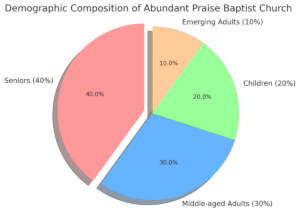
Demographic Composition of Abundant Praise Baptist Church. Pie chart. Created with the assistance of ChatGPT, OpenAI, on April 15, 2024.
The Abundant Praise Baptist Church is a mosaic of ages and experiences, with 40% seniors, 30% middle-aged adults, 20% children, and 10% emerging adults.
However, this diversity presents challenges, particularly in bridging the generational divide within its walls. Older members often dominate leadership roles, which has unintentionally marginalized younger congregants and stifled the development of new leaders. Despite this, the church’s location—a cornerstone in a community that includes amenities like Abundant Praise School and Abundant Praise Park—offers unique opportunities for outreach and engagement, underscoring the congregation’s potential to act as a beacon of hope and cohesion within Silverleaf.
Exploring the Gap Between Generations in Church Engagement

Photo by LaShawn Dobbs on Unsplash
My research project at Abundant Praise Baptist Church was driven by a critical issue: the widening gap between the church’s traditional approaches and young adults’ engagement.
The voice of young adults like Ava2, who feels sidelined by an older generation’s perception of youth, underscores this generational divide. This sentiment is reflected in broader studies, such as those by Christian Smith in Souls in Transition, where he identifies a pervasive sense of religious disconnection among young adults. Smith’s research indicates that many older adults in the church believe that “the younger generation is either indifferent or alienated from spiritual practices. . .”3 which only intensifies the separation of young congregants.
Understanding and Addressing Generational Disconnect
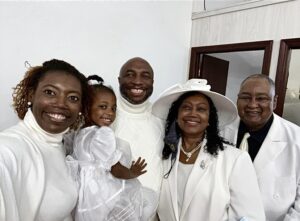 My project of creating cross-generational connections in the Abundant Praise Baptist Church utilized qualitative research methods to tackle this issue, including in-depth interviews and focus groups with young adults within the Abundant Praise Baptist Church. My chosen method was designed to explicitly capture the rich, nuanced perspectives that quantitative data alone could not provide. By engaging directly with individuals like Ava, we explored the personal narratives of emerging adults at Abundant Praise, which revealed how and why traditional worship practices may have failed to resonate with the younger generation. For instance, Ava’s critique that worship needs to be more “alive and relevant” reflects a broader desire for authenticity and engagement that is currently missing for many young adults. These insights were vital in shaping our understanding and guiding the development of practices that can bridge the generational divide. Likewise, Cason4, a young adult member of Abundant Praise, contends, “My generation seeks guidance from the elders, but some of the older adults insist on replicating their methods without deviation.”5 More significantly, in the evolving landscape of leadership within communities, young adults express a nuanced appreciation for the historical significance of past leaders while advocating for a more all-encompassing approach to leadership within their movements.
My project of creating cross-generational connections in the Abundant Praise Baptist Church utilized qualitative research methods to tackle this issue, including in-depth interviews and focus groups with young adults within the Abundant Praise Baptist Church. My chosen method was designed to explicitly capture the rich, nuanced perspectives that quantitative data alone could not provide. By engaging directly with individuals like Ava, we explored the personal narratives of emerging adults at Abundant Praise, which revealed how and why traditional worship practices may have failed to resonate with the younger generation. For instance, Ava’s critique that worship needs to be more “alive and relevant” reflects a broader desire for authenticity and engagement that is currently missing for many young adults. These insights were vital in shaping our understanding and guiding the development of practices that can bridge the generational divide. Likewise, Cason4, a young adult member of Abundant Praise, contends, “My generation seeks guidance from the elders, but some of the older adults insist on replicating their methods without deviation.”5 More significantly, in the evolving landscape of leadership within communities, young adults express a nuanced appreciation for the historical significance of past leaders while advocating for a more all-encompassing approach to leadership within their movements.
 Reflective Analysis of Research Design and Its Implications
Reflective Analysis of Research Design and Its Implications
My research aimed to pinpoint the disengagement issues of emerging adults and stimulate a cross-generational dialogue that can lead to substantial changes within the Abundant Praise Baptist Church and the Silverleaf Community. My intention to collaborate and incorporate a variety of viewpoints from both young and older members helped create a holistic view of the congregational dynamics, which was essential for crafting effective interventions.
The Goals of Cross-generational Connections:
• To create a church environment that honors its traditions while innovatively engaging with the needs of younger members, thereby revitalizing its community presence and relevance.
• Gather insights from emerging adults and senior members in Abundant Praise, which is crucial for creating cross-generational unity in the congregation.
• To understand the shifting trend among emerging adults and its impacts on the Abundant Praise Baptist Church engaging the Silverleaf Community of Durham, NC.
A Catalyst For Broader Social Connection
The Cross-Generational Connection Supper at Abundant Praise Baptist Church highlighted the profound impact of community engagement on social integration. My findings from this initiative underscore the significance of creating a space where individuals from diverse generational backgrounds can share experiences and insights. Such engagement not only strengthens communal bonds but also enhances the collective resilience of the community.
From my observations at Abundant Praise’s Cross-generational Connection Supper, promoting cross-generational dialogue contributes significantly to social cohesion, thereby fostering a more inclusive society. This model could serve as a blueprint for other communities aiming to bridge generational divides and promote a unified community ethos.
Mentorship as a Foundation for Personal and Professional Development
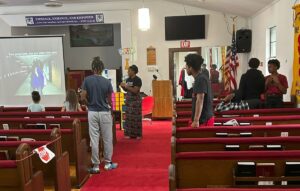 Our Cross-generational Connection Supper initiative revealed an intense desire among young adults for mentorship that combines spiritual guidance and professional development. Implementing structured mentorship programs could address this need by pairing young adults with seasoned professionals within the congregation. Likewise, the cross-generational approach can significantly influence career trajectories and personal growth. More significantly, by formalizing these relationships, congregations can provide a supportive network that contributes to individual and communal growth, preparing young adults to take on leadership roles within and beyond the church community.
Our Cross-generational Connection Supper initiative revealed an intense desire among young adults for mentorship that combines spiritual guidance and professional development. Implementing structured mentorship programs could address this need by pairing young adults with seasoned professionals within the congregation. Likewise, the cross-generational approach can significantly influence career trajectories and personal growth. More significantly, by formalizing these relationships, congregations can provide a supportive network that contributes to individual and communal growth, preparing young adults to take on leadership roles within and beyond the church community.
Inclusive Leadership to Reflect Diversity
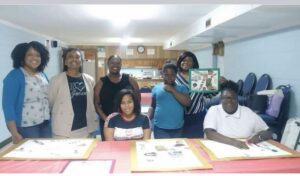
The Abundant Praise Baptist Church Cross-generational Connection Team. This photograph, taken by Shawn D. Lipscomb, Sr in November 2023
The call for leadership that mirrors the community’s diversity is a critical takeaway from our discussions at the Abundant Praise Baptist Church’s Cross-generational Connection Supper:
• Adopting inclusive leadership practices can make the church environment more relatable and inviting, enhancing member engagement across all demographic groups.
• Shifting towards inclusivity can also extend to addressing broader societal issues, which resonates with the younger members of our congregation who advocate for a more active role in social justice.
• Leadership studies support the idea that diverse leadership promotes better decision-making and problem-solving by incorporating a broad range of perspectives, thus enriching the church’s approach to community and spiritual leadership.
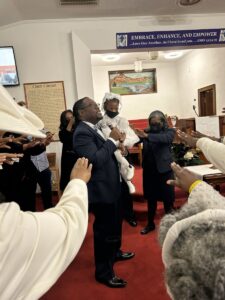
The Abundant Praise Baptist Church in worship service in December 2023. This photograph was taken by Cason. Granted Permission by the Abundant Praise Video Ministry
Looking Ahead
The Cross-Generational Connection Supper sets a promising precedent for Abundant Praise Baptist Church and other communities seeking to bridge generational gaps. The initiative’s success demonstrates the potential for similar gatherings to serve as catalysts for change, promoting unity and inclusivity across diverse demographic groups. As the Abundant Praise members continue leveraging the lessons learned from this event, it is poised to enhance its ministry and outreach efforts significantly. The Cross-Generational Connection Team’s pioneering approach to fostering intergenerational dialogue and collaboration offers a model that other communities can adapt to their unique contexts. This initiative enriches the church’s community life and signals a shift towards more inclusive practices that can inspire and influence broader societal efforts to achieve unity and inclusivity across generations.
Conclusion
As the Abundant Praise Baptist Church congregation embarks on this transformative journey, we must remember that change takes time and effort. We must be patient and committed to continuously evaluating and adapting church strategies to meet young adult’s evolving needs and preferences. Abundant Praise’s ultimate goal is to create a vibrant and inclusive environment where young adults can find connection, empowerment, and a deepening relationship with God. Likewise, I firmly believe that congregations can create a church that authentically and relevantly engages young adults by embracing a cross-generational approach to ministry. More significantly, cross-generational visibility and representation within the church community are crucial for the growth and impact of our ministry.
Recommendations:

Photo by Kelly Sikkema on Unsplash</Accessed April 19, 2024.
In recent discussions with participants after the Abundant Praise Baptist Church Cross-Generational Connection Supper, qualitative data points were gathered through feedback form, which reflected their preferences, needs, and suggestions for deeper engagement within the church community’s young adult population. Listed below is what the Cross-Generational Connection Supper revealed about the critical areas for development.
1. Community Engagement: The data underscores a pronounced desire among young adults for a sense of belonging that transcends mere service attendance.
- They yearn for genuine connections that weave into the fabric of their personal lives, extending beyond the confines of religious activities.
- This demographic also highlights the importance of a robust support system to navigate life’s challenges.
- To address these needs, congregations could initiate small group gatherings that focus on various life stages and interests, encouraging personal interactions and the formation of a dependable community network.
2. Mentorship: There is a palpable interest in mentorship programs that offer career and personal guidance alongside spiritual support.
- The concept of two-way mentorship, encompassing regular check-ins and advice on professional development, is particularly appealing.
- It suggests a framework that acknowledges African American young adults’ unique hurdles.
- Implementing a structured mentorship program that pairs young adults with experienced professionals within the congregation could facilitate meaningful growth and support, catering to both spiritual and secular aspirations.
3. Inclusivity and Leadership: The call for leadership that mirrors the community’s diversity is loud and clear. Such representation can make the church environment more relatable and inviting.
- Young adults advocate for the church’s active engagement in social issues, reflecting a broader understanding and involvement in community concerns.
- Empowering young adults to assume leadership roles signifies a readiness to invigorate the church’s mission with fresh perspectives and energy.
- To this end, leadership training programs and forums for discussing social issues could be valuable additions, enhancing inclusivity and leadership development.
4. Young Adult Ministry: The absence of a ministry specifically tailored to young adults is acutely felt.
- Establishing such a ministry is seen as a vital step towards bridging this gap, promising to boost engagement levels significantly.
- A young adult ministry could serve as a dynamic platform for spiritual growth, social connection, and community impact.
- Organizing events, workshops, and service projects that resonate with the interests and concerns of young adults would be instrumental in achieving this vision.

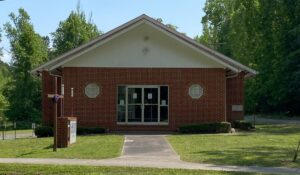


Pastor Lipscomb! So very proud of you, your church and Doctorial work. It was just like yesterday when we studied at Duke. Continue the genuine work that you have started! Thank you for sharing on how to Bridge the Gap intergenerationally!.
Pastor Arlene